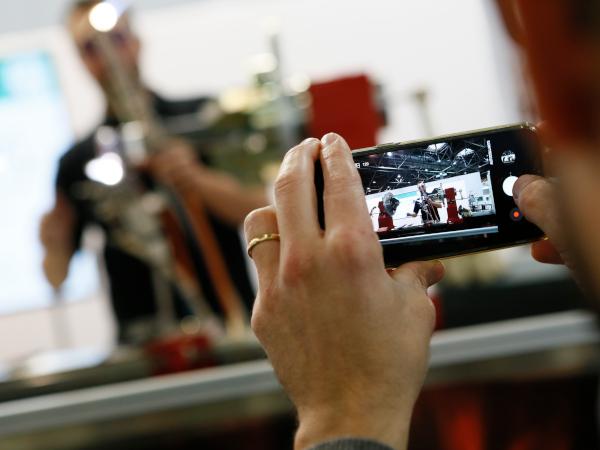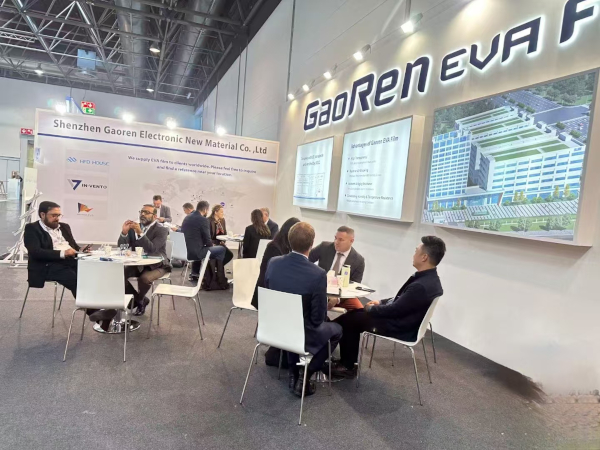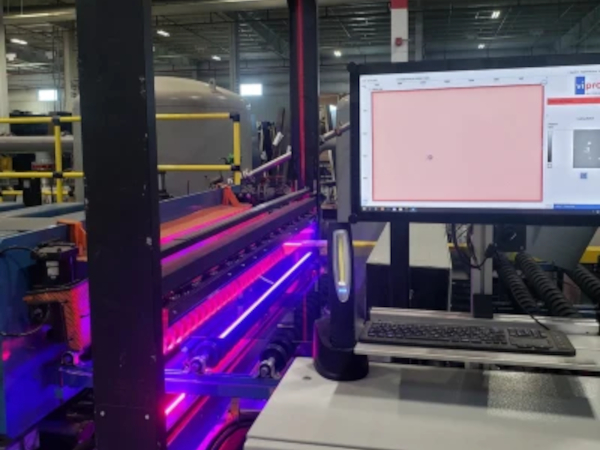
Date: 17 May 2024
Digital technologies and AI are also a major topic for the future of the craft sector – “Craft 4.0”. At glasstec 2024 the integration of digital technologies in the industry and in the craft sector will be one of the Hot Topics.
The use of digital tools has been rising steadily for years now. The term “Craft 4.0” has now entered general use to describe the digitalization and modernisation seen in the craft sector – similar to the Industry 4.0 concept in the manufacturing sector. The integration of digital technologies, the use of AI, the automation of a wide variety of processes and the connection of systems can considerably increase the speed, efficiency and quality of processes as well as end results. In addition, digitalization can help glaziers counter skilled labour shortages – by digitalising production processes and workflows. Being the most relevant meeting point for the glazier trade, glasstec provides the ideal platform for information and inspiration – thanks to future-proof digital solutions specifically geared to craftspeople.
Status quo: digital tools in the glazier trade
The glazier trade as a whole is on an exciting path towards digital transformation. By selectively using digital tools and AI applications many craft operations are now already optimising their workflows and improving product quality thereby offering their customers even better service. Here are some examples:
Design and production
CAD/CAM software (Computer-Aided Design/Computer-Aided Manufacturing) enables glaziers to generate precise designs for glass products and, ideally, finalise them for automated manufacturing machines. This increases production efficiency and markedly reduces the error rate.
Quality management
Quality control can be substantially improved by using image recognition systems that detect defects or irregularities in glass products quickly and reliably. This reduces the number of complaints.
Job handling
Material planning, job and deadline management, capacity organisation as well as accounting can be handled by software tools that are entirely tailored to craftsmen’s needs. This saves a great deal of time and administrative work.
Customer management
Digital tools help to professionalise customer management. They enable glaziers to not only capture and/or manage addresses, quotes and invoices but to also save relevant information or historical data regarding customers. One click – everything to hand.
Customer communication
Websites and social media should by now form an integral part of operations for many glaziers. They can be extended to include chatbots or virtual assistants that respond to customer enquiries, for example, for communicating with customers and interested parties. A clear improvement of communication and service.
On-site customer service
Mobile Apps allow craftsmen to access, present or even personalise all relevant data during on-site customer visits. This includes pricing or appointment details that can be completed with just a few entries. This ensures a positive customer journey.
Tomorrow’s technology today
The big question: how can the craft sector implement the digital transformation in the best possible way? What should the solutions needed here look like? Where should craft operations start? There are many questions arising on the path towards digitalization and there are many different answers. One possible approach might look like this:
- Taking stock: Analysis of workflows, technologies and processes in operations. Pinpointing the areas suitable for digitalization.
- Definition of goals: Such goals could include: efficiency gains, productivity gains, optimisation of customer interaction or development of new business lines.
- Selection of suitable technologies and tools: Key here is to ensure the smooth interaction between, and scalability of, the software packages for different business areas.
- Trial phase: Test and optimisation of the new processes and systems during implementation to solve any problems early on or to avoid them from the outset.
- Training sessions: These are indispensable because the correct handling of tools by staff is what makes or breaks the success of digitalisation.
- Monitoring and optimisation: Continuous monitoring and assessment of the digital processes and systems, and adjustments, if need be.
- Further development: Check the digital strategies and technologies at regular intervals and update them if needed.
Digital solution for the glazier trade
glasstec 2024 will give you the opportunity to talk to various digital tool providers – also for the glazier trade – and test their solutions.
For over 15 years now Swiss software company brf Solutions has developed and sold solutions for the glass sector. For instance, Safir is its ERP solution (Enterprise-Resource-Planning) targeted to the requirements of small and medium-sized companies. An ERP software system like this allows you to manage your entire company because it supports automation as well as the processes related to finance, human resources, manufacturing, supply chain, services and sourcing, to name but a few. The comprehensive version also offers a glass configurator and installation planning.
The glazier software VERAS was developed by the German provider bitec in close cooperation with its customers and is therefore precisely tailored to the needs of the sector. Comprising a multitude of modules, this solution can be adapted precisely to the customer’s individual operational requirements. To allow you to fully focus on your customers and production, the VERAS software assists you throughout, from measuring and drawing up the quote to production, product shipping and invoicing.
Industry get-together as a beacon
With its special show “HANDWERK LIVE” (craft live) glasstec as the world-leading international trade fair offers the glazier trade a unique platform for gathering information and exchanging knowledge, experience and innovations in the glass and glass processing sector. Sharing know-how on the most relevant innovations provides valuable impulses for focusing on the future. The unparalleled and comprehensive line-up boasts exciting lectures as well as products and live applications.
The most important meeting point for the glass processing trade is the joint stand of BIV – Federal Association of Glazier Trades – the ideal forum for meeting colleagues from all across Germany and the world.
Save the Date: 22 - 25 October 2024, Messe Düsseldorf
 600450
600450







Add new comment